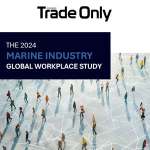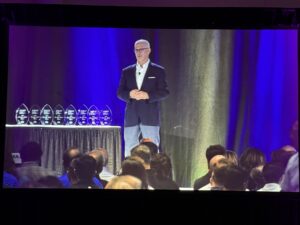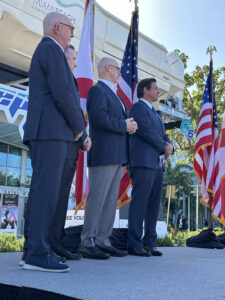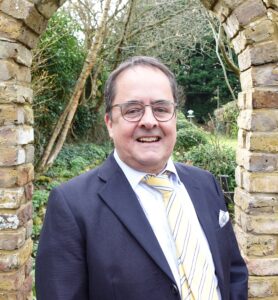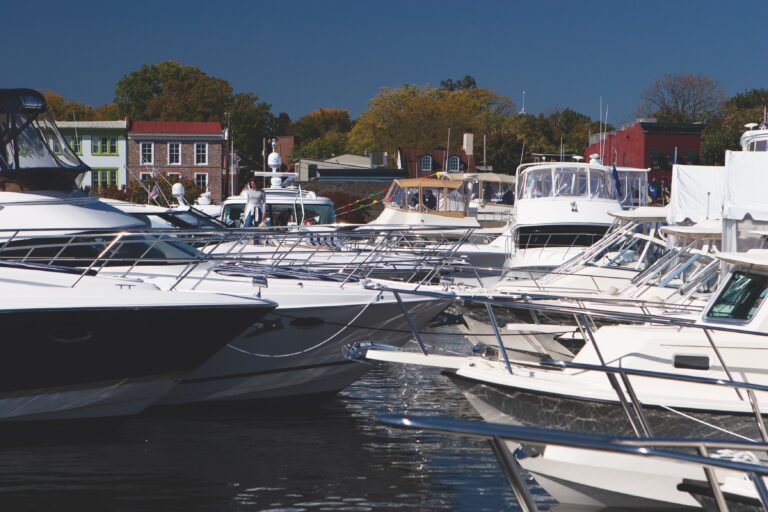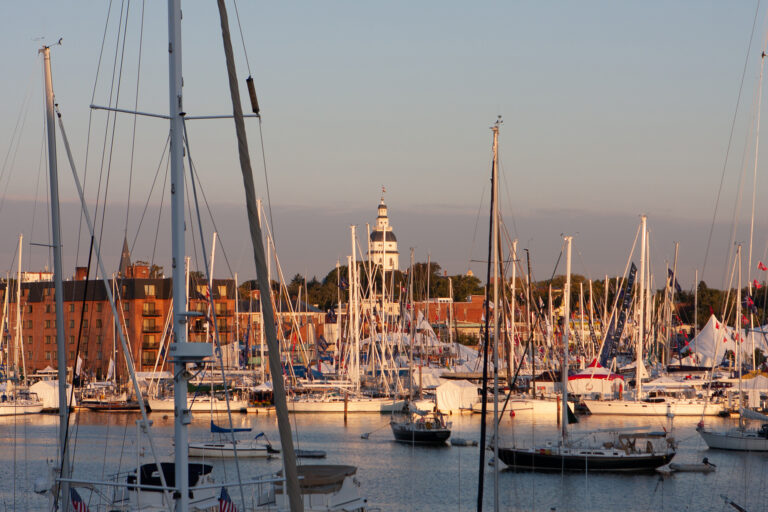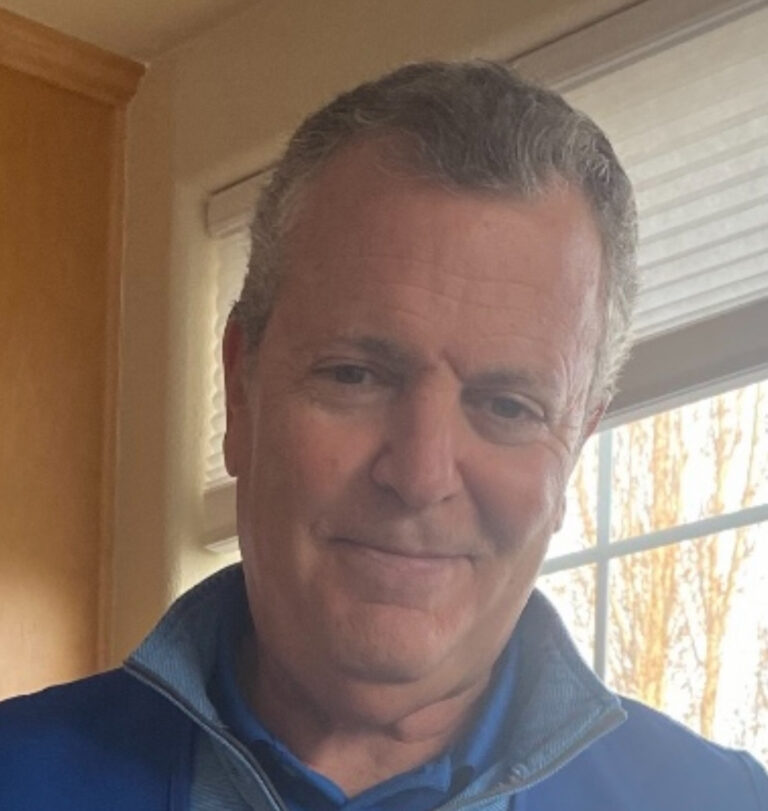
The manager of the Miami International Boat Show and the city’s mayor say they’re confident the legal controversy surrounding the new venue will be resolved before the scheduled start of the show in February.
Mayor Tomás Regalado says he envisions no scenario in which the show, facing legal challenges from the neighboring village of Key Biscayne, will not take place. He says site work at the Miami Marine Stadium Park and Basin is on schedule and on budget.
National Marine Manufacturers Association vice president Cathy Rick-Joule, the longtime manager of the Miami show, says she believes both sides have a strong desire to reach a resolution during mediation talks taking place this summer. “I continue to hear what I’ve heard all along — that the village of Key Biscayne is not opposed to the boat show,” she says. “The real concern is development of Virginia Key in total. They want to be involved in what’s going on there and what decisions the city is making.”
Rick-Joule says both sides are well aware of the positive impact the show has on the region. “They have recognized the economic driver it is, how important it is, and they realize they have lot of boaters who live there,” she says.
A lot of misinformation has been put forward, causing more anxiety than was necessary, Rick-Joule says. “I believe at the root of almost anything when this kind of conflict arises, it’s about understanding. This is symptomatic of that.”
Key Biscayne Mayor Mayra Lindsay has been outspoken in her opposition since the announcement that the show was moving to the marine stadium park. “The village of Key Biscayne is committed to being good neighbors and working toward an amicable resolution, but the devil is in the details,” she says. “We unfortunately do not have much confidence that the city of Miami or the boat show has the best interests of Miami-Dade taxpayers and residents in mind, given their track record of closed-door dealings and misleading information.”
The last thing Key Biscayne wants is to be tied up in litigation with its neighboring municipality, she says. “But we need to do what is right for this piece of property and for Miami-Dade residents. We tried to have a seat at the table as a fair partner in this process, but were repeatedly ignored; litigation is our last attempt to hold the city and boat show accountable.”
Not only does the city’s plan to commercialize the Marine Stadium site violate the deed of the property, “it flies in the face of the 2010 Virginia Key Master Plan, which called for as much access to public waterfront land as possible and permanent open green space,” Lindsay argues. She also says the show will bring too much traffic to the area, will cause backups for miles and will harm the environment. She says she fears that development of the flex park will prompt the city of Miami to bring scads of events to the venue.
Regalado says that won’t happen. “We have told Key Biscayne that we’re willing to accommodate them in terms of guaranteeing that no show of this magnitude will be done except the boat show … which seems to be their concern,” the mayor said in early July. “We said that during the joint commission meeting we had a few days ago. I think that’s as far as the city can go. And I think that for them it will be a political win. Actually we didn’t have any plans to start with to have a boat show or other big event every week.”
Regalado says that as each of the village’s concerns gets addressed, another arises. “First it was the traffic. So both police departments and departments of transportation made a plan, and their police department was happy and understood that we will have a traffic plan in place,” he says. “Then it was, ‘Well, you know, we’re afraid you will do this every week.’ So we will guarantee we won’t do this every week. Then it was ‘Well, it will be very intrusive in the water.’ This is a water place. Then they said we were in violation of the deed. We’re not; it’s been vetted by many experts, and the city’s legal department and outside counsel, and we’re good. Then they said, ‘You took down some mangroves.’ Apparently the contractor made a mistake, which was back in May. The contractor is going to pay for the remediation.”

An environmental issue that briefly was pushed in earnest was the floating dock system, which village officials said would fill the waterways with plastic foam. But Bellingham Marine product development manager Steve Ryder says the type of dock the company is building is “very different than the docks that have been used at other sites and events using exposed foam. With our nearly 60 years of experience in all types of marine environments, we design and build products that will survive in those harsh climates, but also use products that don’t harm the environment.”
Instead, expanded polystyrene is completely encapsulated in a hard plastic polyethylene shell to ensure that no flaking or destruction of the core can enter the water. The float shell consists of hard polyethylene made with UV inhibitors to prevent fading and degradation.
“So every problem has been solved, and always there is another problem that comes up,” says Regalado. “Then the whole thing is, ‘We don’t want the boat show because there are too many cars.’ I still don’t understand how a city or mayor can jump from one argument to another one,” he says. “The bottom line is they say, ‘No, we don’t want the boat show at all.’ But they haven’t been able to explain why.”
The mediation talks that are required by state law are continuing, and the city is working in good faith, Regalado says. “If this ends up in court, it will be the first time in history that a court would rule that one city can dictate what another city can do.”
Key Biscayne is home to more than 15,000 residents and receives upward of 10 million visitors a year, says Lindsay. “With only one road in and one road out, even the best designed traffic flow plan will be ill-equipped to address the disruption caused by the boat show — and it is irresponsible to attempt to bring so many people into an area that simply cannot contain it, without adequate parking, no less.”
Tennis parallel
Some boat show supporters point to the Sony Tennis Open, which attracts more than three times as many visitors to the area as the boat show and lasts for two weeks, and wonder why the village supports that event. Regalado says that event is a “free-for-all” in terms of traffic and parking. “There is no plan other than long lines of cars entering the causeway or exiting I-95 and blocking Brickell,” he says. “That’s a fact, and the city of Miami has to live with it, and Key Biscayne has to live with it.”
“The Sony Open is a completely different kind of event — one that is not on an environmentally sensitive piece of property and has plenty of access to parking space,” counters Lindsay. “While it certainly creates challenges and traffic, it is a minor inconvenience, unlike the magnitude and scope of what is being proposed by the boat show, which would cause irreparable damage to our environment and block waterfront access to the public for up to six months of the year.”
The tennis tournament is three times longer and three times more crowded, says Rick-Joule. “Ours is controlled. There will be a lot of officers and a lot of electronic signage. We’re going through a very lengthy process of communicating to exhibitors on where they can and cannot park, and where they can and cannot get taxi service.”
As a side note, the PR firm hired by the village of Key Biscayne, Schwartz Media, also was hired by the tennis tournament to rally favorable public opinion to keep it in the area. “The county has been renting the parking lot for the tennis tournament for thousands of cars for many years,” Regalado says. “I just don’t know what to tell you. I think this has become a political battle. But this is not about politics. This is about the boat show, which is a signature event that we have here in South Florida. Key Biscayne, and especially the mayor, have not explained why they have a problem with the boat show and not a problem with a tennis tournament which creates a difficult situation for Miami and Key Biscayne for three weeks — not just a weekend.”
Lindsay also is skeptical about water taxis moving through environmentally protected waters and says Miami residents prefer their cars to alternative modes of transportation.
Environmental issue
That leads to the other major concern — that the area is too environmentally sensitive to host a boat show — and it arose after the Army Corps of Engineers flagged a permit in May when it said mitigation measures would be needed to offset the negative environmental effects of temporary docking in the basin for 90 days. The permit set off a flurry of news coverage, although boat show organizers say the most recent Corps of Engineers request is a typical component of every permitting process for boat shows.
“The boat show still has many steps to go through before a permit is provided, and we do not have the confidence that these can be overcome, given the very nature of the property’s allowable use and environmental sensitivities,” Lindsay says.
Rick-Joule says organizers are working closely with local, state and federal agencies on applications and permits. “We responded to numerous requests for additional information from all of them. This is a process we go through every year as it relates to boat shows. We’ve been able to answer all the requests for information forwarded to us in completeness.”
Fisheries regulators will review the assessment from the Army Corps of Engineers that mitigation efforts might be needed to minimize “significant impact” on an essential fish habitat. “So if they think there will be an impact, and if mitigation is applicable, which it could be, that agency will tell us,” says Rick-Joule. “They would ask us to do mitigation, which we would and which we always do. It’s just a process that you have to go through. The agencies, in my opinion, have always been extremely fair and extremely thorough because they take what they do very seriously.”
Regalado questioned the authenticity of the concerns, saying the marine stadium used to have boat races and seaplane races regularly. “Why the change?” he asks. “The only thing that has changed is that the marine stadium was empty for several years and now it’s coming back to life. Key Biscayne, it’s a very small, exclusive town. I understand they want to protect their residents. But overall for the South Florida economy, the boat show is an economic engine. They don’t dispute the fact that hundreds and hundreds of people will be working to set up and dismantle and to work there before and after the show.
“I just don’t see a scenario where the boat show wouldn’t happen,” Regalado says. “We are on time, doing construction for what they need. We are on budget for what they need. We are on target. We went before the Greater Miami Convention and Visitors Bureau and have 100 percent of their support in terms of rooms and amenities for visitors. Everything is ready. I do not foresee anything that could come our way that will stop the boat show.”
Organizers emphasize that the show generates $600 million in economic activity and supports 55,000 Florida jobs. In addition, boat show patrons and exhibitors fill about 200,000 hotel room nights in the Miami area, spending an estimated $83 million while they’re in town.
“I think that this boat show will show the world that Miami is the place for boaters,” says Regalado. “It is important for Miami because Miami is all about water. And I think it will be a great experience for Miami.”
This article originally appeared in the August 2015 issue.

